Career and Technical Education (CTE) | Agricultural Science
Agriculture, Food, and Natural Resources Career Cluster: What Is It?
Coming from a family of educators, Brad knows both the joys and challenges of teaching well. Through his own teaching background, he’s experienced both firsthand. As a writer for iCEV, Brad’s goal is to help teachers empower their students by listening to educators’ concerns and creating content that answers their most pressing questions about career and technical education.
Career clusters are areas of study within Career and Technical Education (CTE). You may have heard of the Agriculture, Food, and Natural Resources career cluster before. But what does this area of study entail? And why is it an important sector in which students should consider careers?
In this article, we'll take a closer look at the Agriculture, Food, and Natural Resources career cluster, why it's important, and the education required to pursue these careers.
What Is the Agriculture, Food, and Natural Resources Career Cluster?
The Agriculture, Food, and Natural Resources (AFNR) career cluster is an educational area centered around consumable resources. It's one of 16 clusters in Career and Technical Education (CTE).
According to Advance CTE,
"This Career Cluster is focused on the production, processing, marketing, distribution, financing, and development of agricultural commodities and resources including food, fiber, wood products, natural resources, horticulture, and other plant and animal products or resources."
While many people associate the AFNR career cluster with farmers and farming, it encompasses much more than raising crops and livestock. Careers in this cluster also involve systems for the production and sale of food, the maintenance of agribusinesses, environmental service and safety, and much more.
Students often consider careers in this pathway because they love working with food and animals and care about the environment. They may also choose this career cluster because they are interested in a profession that directly impacts nearly every other area of life.
Why Is the Agriculture, Food, and Natural Resources Career Cluster Important?
The Agriculture, Food, and Natural Resources career cluster is vital to creating the world's food supply and preserving its natural resources and environment. With over 330 million people living in the United States in 2023, our country is larger and consuming more resources than ever before.
Professionals in the AFNR career sector ensure our country's food supply and natural resources are available today and preserved for future generations. They accomplish this through raising crops and livestock, researching and improving modern farming techniques, and establishing regulations for conserving natural and manmade products.
Ultimately, agricultural science careers are vital to both the economic and environmental sustainability of our nation's infrastructure. When students choose careers in agriculture, food, and natural resources, they are committing to a rewarding career that involves caring for people, plants, and animals in the present while ensuring a bright future for all.
What Are Pathways within the Agriculture, Food, and Natural Resources Career Cluster?
There are seven career pathways within the Agriculture, Food, and Natural Resources career cluster. When students choose a pathway, they'll be able to specialize their CTE education with courses designed to prepare them for a specific group of agricultural careers.
The seven pathways are:
1. Agribusiness Systems
2. Animal Systems
3. Environmental Service Systems
4. Food Products and Processing Systems
5. Natural Resources Systems
6. Plant Systems
7. Power, Structural, and Technical Systems
Let's take a closer look at what each pathway entails and what careers students can pursue.
1. Agribusiness Systems
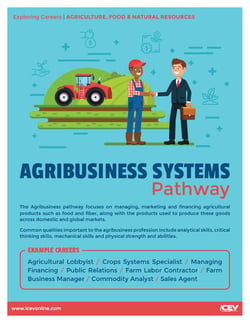
The Agribusiness Systems pathway focuses on managing, marketing, and financing agricultural products, such as food and fiber, along with the products used to produce these goods across domestic and global markets.
Some examples of careers in the Agribusiness Systems pathway include:
- Agricultural Lobbyist
- Crops Systems Specialist
- Managing
- Financing
- Public Relations
- Farm Labor Contractor
- Farm Business Manager
- Commodity Analyst
- Sales Agent
Common qualities important to careers in agribusiness include analytical, critical thinking, and mechanical skills, in addition to physical strength and abilities.
2. Animal Systems
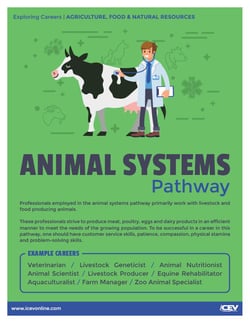 Professionals employed in the Animal Systems pathway primarily work with livestock and food-producing animals. In doing so, they seek to efficiently produce meat, poultry, eggs, and dairy products to meet a growing population's needs.
Professionals employed in the Animal Systems pathway primarily work with livestock and food-producing animals. In doing so, they seek to efficiently produce meat, poultry, eggs, and dairy products to meet a growing population's needs.
Careers in the Animal Systems pathway include:
- Veterinarian
- Livestock Geneticist
- Animal Nutritionist
- Animal Scientist
- Livestock Producer
- Equine Rehabilitator
- Aquaculturalist
- Farm Manager
- Zoo Animal Specialist
To have a successful career in Animal Systems, it’s essential to have customer service and problem-solving skills, as well as patience, compassion, and physical stamina.
3. Environmental Service Systems
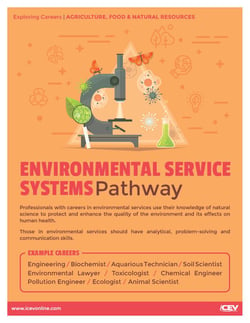 Professionals in the Environmental Service Systems pathway work to protect and enhance the quality of the environment and its effects on human health.
Professionals in the Environmental Service Systems pathway work to protect and enhance the quality of the environment and its effects on human health.
Examples of careers in environmental services include:
- Engineering
- Biochemist
- Aquarious Technician
- Soil Scientist
- Environmental Lawyer
- Toxicologist
- Chemical Engineer
- Pollution Engineer
- Ecologist
- Animal Scientist
Analytical, problem-solving, and communication skills are all relevant to work in this pathway.
4. Food Products and Processing Systems
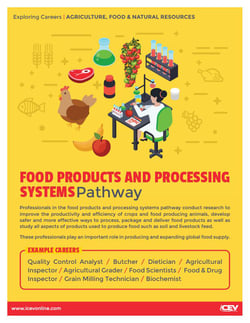 Occupations in the Food Products and Processing Systems pathway focus on research to improve the productivity and efficiency of crops and food-producing animals. They also develop safer and more effective ways to process, package, and deliver food products. In addition, food products professionals study all aspects of products used to produce food, such as soil and livestock feed.
Occupations in the Food Products and Processing Systems pathway focus on research to improve the productivity and efficiency of crops and food-producing animals. They also develop safer and more effective ways to process, package, and deliver food products. In addition, food products professionals study all aspects of products used to produce food, such as soil and livestock feed.
Careers in this pathway include:
- Quality Control Analyst
- Butcher
- Dietician
- Agricultural Inspector
- Agricultural Grader
- Food Scientist
- Food & Drug Inspector
- Grain Milling Technician
- Biochemist
Professionals in the Food Products and Processing Systems pathway play a critical role in maintaining and expanding the global food supply.
5. Natural Resources Systems
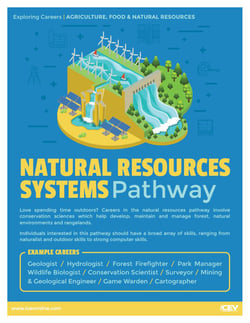 Professionals in the Natural Resources Systems pathway pursue careers in conservation science to develop, maintain, and manage forests, natural environments, and rangelands.
Professionals in the Natural Resources Systems pathway pursue careers in conservation science to develop, maintain, and manage forests, natural environments, and rangelands.
Some examples of conservation careers include:
- Geologist
- Hydrologist
- Forest Firefighter
- Park Manager
- Wildlife Biologist
- Conservation Scientist
- Surveyor
- Mining & Geologist Engineer
- Game Warden
- Cartographer
Individuals interested in this pathway should have a broad range of skills, from naturalist and outdoor skills to computer skills.
6. Plant Systems
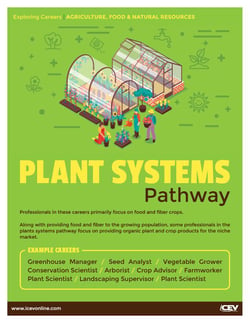 The Plant Systems pathway prepares students for careers working with food and fiber crops. Along with providing food and fiber to a growing population, some professionals in the Plant Systems pathway focus on offering certified organic plant and crop products.
The Plant Systems pathway prepares students for careers working with food and fiber crops. Along with providing food and fiber to a growing population, some professionals in the Plant Systems pathway focus on offering certified organic plant and crop products.
Occupational opportunities in this pathway include:
- Greenhouse Manager
- Seed Analyst
- Vegetable Grower
- Conservation Scientist
- Arborist
- Crop Advisor
- Farmworker
- Plant Scientist
- Landscaping Supervisor
Regardless of occupation, careers in this pathway require a love of plants and technical skills related to working in specific agricultural areas.
7. Power, Structural, and Technical Systems Pathway
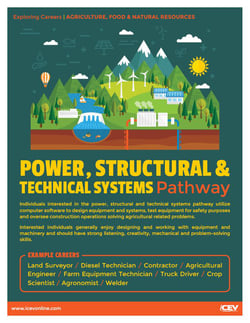 Individuals interested in the Power, Structural, and Technical Systems pathway utilize computer software to design equipment and systems. They also test equipment for safety purposes and oversee construction operations to solve agricultural-related problems.
Individuals interested in the Power, Structural, and Technical Systems pathway utilize computer software to design equipment and systems. They also test equipment for safety purposes and oversee construction operations to solve agricultural-related problems.
Examples of careers in power, structural, and technical systems include:
- Land Surveyor
- Diesel Technician
- Contractor
- Agricultural Engineer
- Farm Equipment Technician
- Truck Driver
- Crop Scientist
- Agronomist
- Welder
Students drawn to these careers generally enjoy designing and working with equipment and machinery and should have strong listening, creativity, mechanical and problem-solving skills.
Postsecondary Education for Agriculture, Food, and Natural Resources Careers
Many students will be ready to begin occupations within the Agriculture, Food, and Natural Resources career cluster directly after high school. However, there are a number of occupations within the AFNR pathway that require postsecondary education and a few that require a baccalaureate or higher degree.
According to Advance CTE, AFNR careers requiring postsecondary training include:
- Agricultural Chemical Dealer
- Bank/Loan Officer
- Environmental Compliance/Assurance Manager
- Equine Manager
- Farm Manager
- Health and Safety Sanitarian
- Meat Cutter/Meat Grader
- Park Manager
- Produce Buyer
- Recycling Technician
- Wildlife Manager
While students will need varying degrees of specialized training to pursue a career in each of these fields, none of them require that students obtain a four-year baccalaureate degree.
On the other hand, these agriculture-related careers will require students to earn a minimum of a bachelor's degree:
- Agricultural Educator
- Botanist
- Ecologist
- Environmental Engineer
- Fish and Game Officer
- Plant Pathologist
- Veterinarian
Some of these positions, such as an agricultural educator or fish and game officer, might only require an undergraduate degree. On the other hand, becoming a veterinarian requires years of specialized training even after earning a bachelor's degree.
Ultimately, students need to know the type and length of education needed to achieve their career goals. Once students have a career goal in mind, they'll be more willing to commit to their chosen CTE pathway.
Meet Your Challenges While Preparing Students for AFNR Careers
The Agriculture, Food, and Natural Resources (AFNR) career cluster is just one of 16 clusters in Career and Technical Education (CTE). But students who pursue careers in this area can make an impact on nearly every corner of society.
In this article, you've learned more about the AFNR career cluster and why it's important. You've also discovered the seven pathways within AFNR and specific careers students can work toward through secondary and post-secondary education.
But preparing students for a diverse set of careers can be challenging. Without tools to overcome obstacles in the classroom, you could be left feeling frustrated and unable to help your learners.
To discover how you can meet your challenges as a CTE teacher, download this free guide. You'll learn tips and tricks to better manage your classroom and prepare your students for career success:
.jpg)

